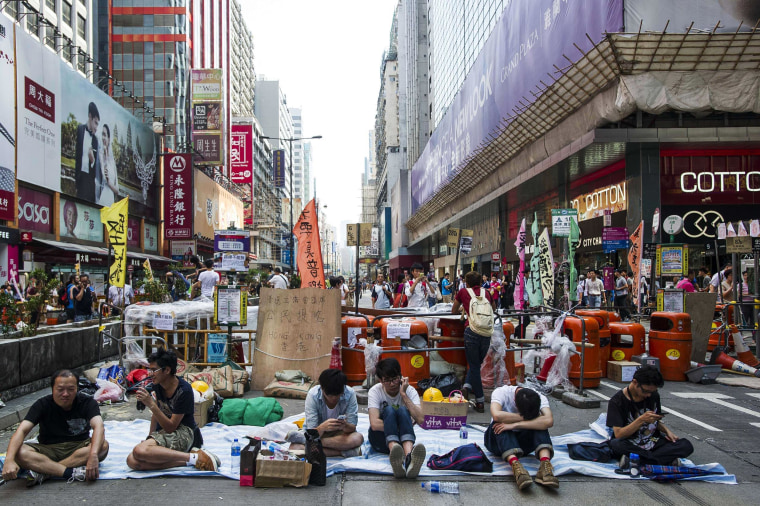HONG KONG -- The sudden reappearance of police officers’ sidearms in holsters raised tension as "Umbrella Revolution" protesters ignored a government-imposed deadline to have the streets cleared by Monday.
Few police officers armed with guns had been spotted in recent days and Hong Kong’s population of 7 million seemed to be holding its collective breath, unsure whether the student-led demonstrations would be crushed.
Hundreds of demonstrators slept nervously on Mongkok's Nathan Road waiting for a police raid to clear them that never materialized.
Paul Edmiston, commander of a police tactical unit patrolling Mongkok, explained that the decision to bring back firearms had been made earlier Sunday. Earlier, police had gone through the Mongkok protest zone telling demonstrators they understand the position they were in, but urged them to abide the law and be peaceful.
“We don’t trust them to do the same for us,” hissed one student wearing a mishmash of sports and motocross protective gear.
Hong Kong has been rocked by a massive weeklong street protest against China's decision to screen all nominees in the first direct elections for Hong Kong's leader, promised by Beijing for 2017. The activists want open nominations and the resignation of the current chief executive, Leung Chun-ying, who has refused to step down.
After over 10 days of occupying key junctions, the early public sympathy for the students had dissipated. Residents have grown wary of constant road closures, shut schools and a slow retail season during an important Chinese national holiday blamed largely on the student demonstrations.
In Mongkok, a densely populated part of Kowloon, residents have been increasingly making their opinion of the students heard. Some “troublemakers” who instigated violence against the students throughout the weekend were allegedly paid by triad organizations to agitate against the demonstrators. But much of the saltiest language directed at the students and young professionals occupying a key road in Mongkok this weekend were from angry older residents who just wanted their lives to go back to normal.
“I know we are inconveniencing the people who live here in Mongkok,” sighed Chen, a student from Hong Kong University who had spoken to many of the annoyed neighbors. “But I hope one day they see that we are fighting not just for ourselves, but for them and their grandchildren.”
Stuck in the middle of all of this were the police in Mongkok. They were in the unenviable position of being asked to be an honest broker in keeping the peace between a student protest movement that didn’t trust them following violence earlier in the week and an anti-occupy contingent that wanted the police to throw them out as Leung had ordered. The previous weekend, police fired tear gas and pepper spray on unarmed protesters, prompting some to defend themselves with umbrellas and homemade masks — an image that gave rise to the movement's unofficial name, the "Umbrella Movement."
But as it became clear that the police would not act against the protesters early Monday, some of the students struck up conversations with the officers.

The topics naturally focused on the events of the past few days. The students had lots of questions.
Queenie, a bartender at a Kowloon bar, asked two taken-aback officers very pointed questions about sexual harassment against female demonstrators.
The officers could only shrug and say they hadn’t been present. Queenie and the students flashed thin smiles and thanked them for talking with them.
“We respect them for doing everything they did tonight to keep us safe, but we still don’t trust them,” said Kevin, a student whose father is also a police officer serving elsewhere in Hong Kong. “It will take much more than tonight to earn our faith in them again.”
As night descended on Hong Kong Monday, students and young professionals were returning back to the camps, wondering whether their fledging trust of the government would grow or be crushed by a crackdown.
The Associated Press contributed to this report.